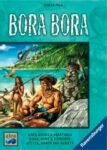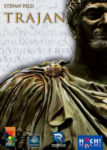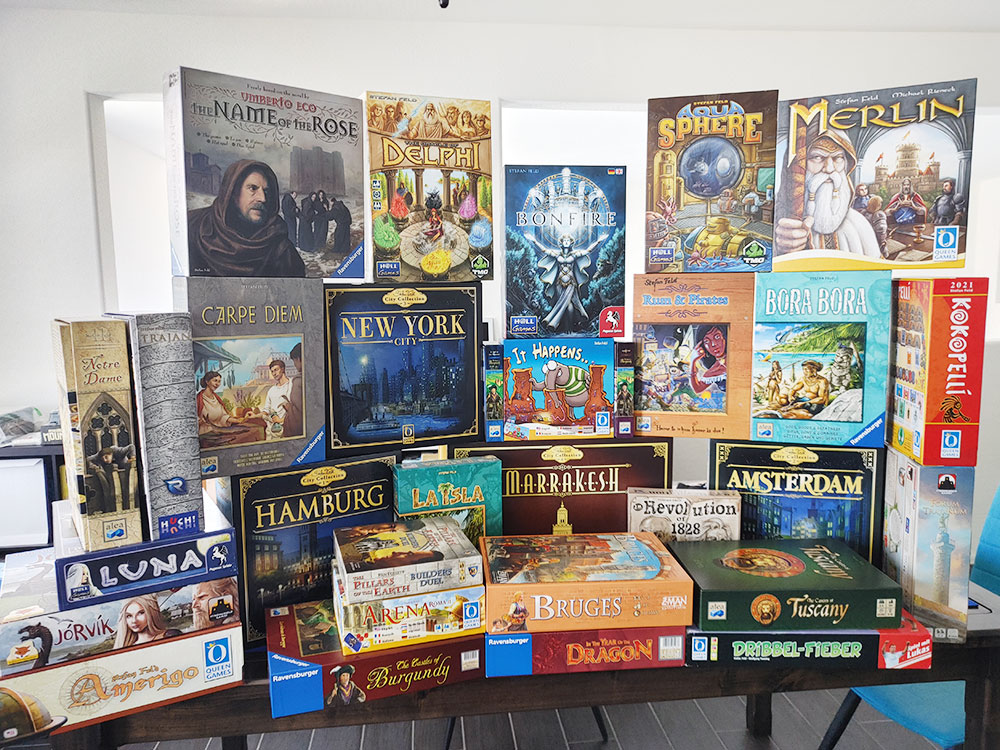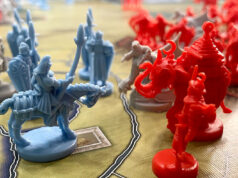There are few debates around Board Game Quest Headquarters as intense as a discussion of the staff members’ favorite game designers. Veteran editor Andrew Smith, for instance, is a devotee of Vital Lacerda (and often bursts into rooms Kool-Aid Man-style shouting, “Kanban!”), while Brian Biewer—whose favorite game of all time is always the last game he played—usually picks the designer of the last game he played as his favorite designer of all time. James Wolff is routinely singing the praises of the unnamed designer of the classic racing (?) game Candyland and Brandon Bryson never stops talking about his favorite designer Cole Wehrle (although he’s never actually bothered to learn his name and refers to him simply as “the Oath guy”). The site’s founder, Tony Mastrangeli, is not excluded from these debates and he often chimes in by saying his favorite designer is whoever has included the most total miniatures in all of his or her designs.
It’s well-known around the BGQHQ water coolers that my favorite designer is educator-by-day and midweight-Euro-designer-by-night Stefan Feld. It stands to reason then that I should be tasked with revealing his top 10 games of all time. (As with all the work I do on this site, this list is definitive and factually accurate in every way. Readers are obligated to agree). I’ve played every one of Feld’s designs with the exception of the long out-of-print and currently obscenely overpriced Strasbourg and his forgotten deduction game The Name of the Rose, which I spent a lot of money on to import from Europe and has since sat mockingly on a shelf in my game room. (The visage of Sean Connery on its box cover glares at me with disapproval each time I walk past.)
Semi-spoiler up front: My favorite game of all time is The Castles of Burgundy, but for the purposes of this list I’m trying to rank Feld’s games by how good of an overall design they are and not necessarily in the order of my preference. (Much in the same way Star Wars is my favorite movie but is not actually the best movie ever made. That’s obviously Rad.)
Without any further delay, here’s the list in all its wooden-cube-filled Euro glory.
Top 10 Stefan Feld Games
Honorable Mentions
Just falling outside the top 10 are four solid Feld games: New York City (formerly Rialto) at #11, Bonfire at #12, The Oracle of Delphi at #13, and the oft-overlooked Forum Tranjanum at #14. Bonfire has a chance to climb with age even though I think, overall, it’s a bit of a bloated design.
10. Carpe Diem
 One of my personal knocks against Stefan Feld (said with love, of course) is that some of his games lean too heavily on extraneous mechanics that bog down the simplicity of his bread-and-butter “point salad” approach (lots of food analogies there). Bonfire and AquaSphere (#16) are good examples of this. The anti-example of this is Carpe Diem, a very straightforward and, despite a clunky rulebook and iffy graphic design, easy-to-play tile-laying game. The nuances in the way the scoring works throughout the game are clearly the highlight of the design, as players will only score certain things at certain points during the game. In some cases, players won’t get to score anything at all.
One of my personal knocks against Stefan Feld (said with love, of course) is that some of his games lean too heavily on extraneous mechanics that bog down the simplicity of his bread-and-butter “point salad” approach (lots of food analogies there). Bonfire and AquaSphere (#16) are good examples of this. The anti-example of this is Carpe Diem, a very straightforward and, despite a clunky rulebook and iffy graphic design, easy-to-play tile-laying game. The nuances in the way the scoring works throughout the game are clearly the highlight of the design, as players will only score certain things at certain points during the game. In some cases, players won’t get to score anything at all.
2-4 Players • Ages 10+ • 45-75 minutes • $18
9. Merlin
 Remember what I just said about Feld’s best games cutting out bloated mechanisms? Yeah, forget all of that. Merlin is about as bloated as a Euro can get. There are components everywhere and a billion different choices on every turn, each with two or three icons players need to know. The base game (vanilla Merlin, if you will) is fairly maligned both in Feld and non-Feld circles, but the first expansion includes a secondary action selection track (more bloat!) and cleans up a few of the issues the base game had. Merlin is a flawed design, but there’s a lot of ingenuity here as well. Still, it’s very possible that this game won’t age as well as some of his other games. Speaking of aging well…
Remember what I just said about Feld’s best games cutting out bloated mechanisms? Yeah, forget all of that. Merlin is about as bloated as a Euro can get. There are components everywhere and a billion different choices on every turn, each with two or three icons players need to know. The base game (vanilla Merlin, if you will) is fairly maligned both in Feld and non-Feld circles, but the first expansion includes a secondary action selection track (more bloat!) and cleans up a few of the issues the base game had. Merlin is a flawed design, but there’s a lot of ingenuity here as well. Still, it’s very possible that this game won’t age as well as some of his other games. Speaking of aging well…
2-4 Players • Ages 12+ • 75 minutes • $69
8. Notre Dame
 Notre Dame is an old game. And I don’t just mean because it was published in the way-back year of 2007. No, I mean because it looks kinda old and feels kinda old and has components that wouldn’t pass quality control in today’s market. But trust me: the connected mechanisms and speed with which Notre Dame moves make it an enduring entry in his catalog for a reason. It’s primarily a drafting game with a fun “charge up your actions” mechanism that Feld has revisited a few times over the years. If somehow you haven’t played this one, you definitely should.
Notre Dame is an old game. And I don’t just mean because it was published in the way-back year of 2007. No, I mean because it looks kinda old and feels kinda old and has components that wouldn’t pass quality control in today’s market. But trust me: the connected mechanisms and speed with which Notre Dame moves make it an enduring entry in his catalog for a reason. It’s primarily a drafting game with a fun “charge up your actions” mechanism that Feld has revisited a few times over the years. If somehow you haven’t played this one, you definitely should.
2-5 Players • Ages 10+ • 45-75 minutes • $30
7. Bora Bora
 Some regard Bora Bora as the heaviest and most complex game Stefan Feld has ever designed, but I don’t really agree with that general assessment. I might feel that way because the design is fairly intuitive in the way rounds are structured and the clear choices players can make. There are just a lot of choices. Bora Bora (which has been tweaked, Kickstarted, and will be reprinted this year as Cuzco, game number six in Queen Games’ Stefan Feld City Collection) shares aspects with The Castles of Burgundy and is a game where every action fits together so cohesively that pulling off big combos is common and exciting every time. This one is widely regarded as a top Feld and for good reason.
Some regard Bora Bora as the heaviest and most complex game Stefan Feld has ever designed, but I don’t really agree with that general assessment. I might feel that way because the design is fairly intuitive in the way rounds are structured and the clear choices players can make. There are just a lot of choices. Bora Bora (which has been tweaked, Kickstarted, and will be reprinted this year as Cuzco, game number six in Queen Games’ Stefan Feld City Collection) shares aspects with The Castles of Burgundy and is a game where every action fits together so cohesively that pulling off big combos is common and exciting every time. This one is widely regarded as a top Feld and for good reason.
2-4 Players • Ages 14+ • 60-120 minutes
6. Marrakesh
 The only new design released thus far as part of the aforementioned City Collection is an outstanding (and complex) game involving a cube tower, action selection, and tracks. (Oh how I love all of those things.) Unlike some of the overly complex games I mentioned earlier, Marrakesh has a lot going on each turn, but the actions available to players all logically connect in a way some of the mechanisms in a game like Bonfire can’t quite achieve. This one isn’t in wide circulation just yet, but the briefest of rundowns is that the cubes that come out of the tower dictate which actions you can either use or inflate for later as you chase resources and, obviously, points.
The only new design released thus far as part of the aforementioned City Collection is an outstanding (and complex) game involving a cube tower, action selection, and tracks. (Oh how I love all of those things.) Unlike some of the overly complex games I mentioned earlier, Marrakesh has a lot going on each turn, but the actions available to players all logically connect in a way some of the mechanisms in a game like Bonfire can’t quite achieve. This one isn’t in wide circulation just yet, but the briefest of rundowns is that the cubes that come out of the tower dictate which actions you can either use or inflate for later as you chase resources and, obviously, points.
2-4 Players • Ages 12+ • 120 minutes
5. Amerigo
 Another cube tower! Amerigo is an old-ish Feld design and also involves a cube tower that dictates the types and power of the actions available to players on every turn. From a design perspective, it’s very inventive as the round structure will restrict the things players can do (can’t build something if you’ve passed that round phase and so on). The theme is more than a little questionable on this one and it’s slated to be updated by Queen relatively soon. This is also something of a sentimental pick as Amerigo is the first Feld design I ever played.
Another cube tower! Amerigo is an old-ish Feld design and also involves a cube tower that dictates the types and power of the actions available to players on every turn. From a design perspective, it’s very inventive as the round structure will restrict the things players can do (can’t build something if you’ve passed that round phase and so on). The theme is more than a little questionable on this one and it’s slated to be updated by Queen relatively soon. This is also something of a sentimental pick as Amerigo is the first Feld design I ever played.
2-4 Players • Ages 10+ • 90 minutes
4. Amsterdam
 So Amsterdam is the reworked Macao and take your pick which version you’d put in this slot. I prefer the slightly tweaked version overall, but the central resource mechanism of the game—collecting them for future turns via a nifty circular timing system—is one of the simplest and most fun ways to force players to plan ahead. The game also has a bunch of interconnected mechanisms in the way goods are acquired and subsequently delivered that is intuitive and very satisfying to pull off. The City Collection as a whole has been something of a grind for Feld fans due to delays in production and occasionally questionable artwork and graphic design, but there’s little argument that Amsterdam is at least a minor improvement over Macao.
So Amsterdam is the reworked Macao and take your pick which version you’d put in this slot. I prefer the slightly tweaked version overall, but the central resource mechanism of the game—collecting them for future turns via a nifty circular timing system—is one of the simplest and most fun ways to force players to plan ahead. The game also has a bunch of interconnected mechanisms in the way goods are acquired and subsequently delivered that is intuitive and very satisfying to pull off. The City Collection as a whole has been something of a grind for Feld fans due to delays in production and occasionally questionable artwork and graphic design, but there’s little argument that Amsterdam is at least a minor improvement over Macao.
1-4 Players • Ages 12+ • 60-120 minutes
3. Bruges
 Like Macao, Bruges no longer exists in our world (it might still be a thing somewhere in Feld’s interconnected Multiverse of Euro Madness) and has been summarily replaced by Hamburg. The main reason Bruges is listed here instead of Hamburg is because I haven’t officially played the reimplimentation yet, but I imagine—mediocre artwork and graphic design aside—that pretty soon I’ll finally get rid of my well-worn copy of Bruges and hang on to Hamburg since it adds some expansions and minor changes that seem like they will improve the overall experience. Still though: Bruges is a wonderful design. Streamlined with very little rules overhead and featuring multiuse cards (you can use them five different ways!) and a touch of a classic negative event Feldism in which the game will punish you for not keeping track of certain things as you play.
Like Macao, Bruges no longer exists in our world (it might still be a thing somewhere in Feld’s interconnected Multiverse of Euro Madness) and has been summarily replaced by Hamburg. The main reason Bruges is listed here instead of Hamburg is because I haven’t officially played the reimplimentation yet, but I imagine—mediocre artwork and graphic design aside—that pretty soon I’ll finally get rid of my well-worn copy of Bruges and hang on to Hamburg since it adds some expansions and minor changes that seem like they will improve the overall experience. Still though: Bruges is a wonderful design. Streamlined with very little rules overhead and featuring multiuse cards (you can use them five different ways!) and a touch of a classic negative event Feldism in which the game will punish you for not keeping track of certain things as you play.
2-4 Players • Ages 10+ • 60 minutes
2. The Castles of Burgundy
 It shouldn’t come as a huge surprise to those who know me (which, thanks to Board Game Quest’s Discord channel can even be you, Dear Reader) that The Castles of Burgundy is so high on this list. It’s my favorite game of all time and, I suppose, also my most-played Euro ever. I find it difficult to imagine that anyone reading a top 10 list about Stefan Feld hasn’t played it, but just in case here’s the rundown: Dice are rolled, hexes are claimed and placed, and players get points for everything. (Fill a section with four pigs? That’s four points. Finish a section of connected buildings? That’s some points for the section plus some points for the round bonus. Get up from the table to grab a La Croix from the fridge? That’s an additional eight points plus four more if you got one for at least one opponent plus two more if the flavor of the La Croix is pamplemousse.) The game is the ultimate gratification rush as you optimize turns to get the most points possible. This is also one of Feld’s truest “midweight” games as it’s fairly easy to teach and play and players get so many points that even losing isn’t as frustrating as when your entire gameplan collapses in something brutal like, say, Feld’s In the Year of the Dragon (#18 on my official Feld list). I can’t wait for my “essential,” absurdly over-produced Awaken Realms reprint to arrive later this year.
It shouldn’t come as a huge surprise to those who know me (which, thanks to Board Game Quest’s Discord channel can even be you, Dear Reader) that The Castles of Burgundy is so high on this list. It’s my favorite game of all time and, I suppose, also my most-played Euro ever. I find it difficult to imagine that anyone reading a top 10 list about Stefan Feld hasn’t played it, but just in case here’s the rundown: Dice are rolled, hexes are claimed and placed, and players get points for everything. (Fill a section with four pigs? That’s four points. Finish a section of connected buildings? That’s some points for the section plus some points for the round bonus. Get up from the table to grab a La Croix from the fridge? That’s an additional eight points plus four more if you got one for at least one opponent plus two more if the flavor of the La Croix is pamplemousse.) The game is the ultimate gratification rush as you optimize turns to get the most points possible. This is also one of Feld’s truest “midweight” games as it’s fairly easy to teach and play and players get so many points that even losing isn’t as frustrating as when your entire gameplan collapses in something brutal like, say, Feld’s In the Year of the Dragon (#18 on my official Feld list). I can’t wait for my “essential,” absurdly over-produced Awaken Realms reprint to arrive later this year.
2-4 Players • Ages 12+ • 30-90 minutes • $40
1. Trajan
 Stefan Feld’s most complete design is also a game that is sometimes forgotten by the mainstream board game elite (a cabal of folks I refer to as “Big Board”). It’s understandable, I suppose, given the relatively drab look of the game and its themeless theme. Trajan is also heavier than the Felds most people talk about, although not nearly as heavy as its reputation might imply. Simply put: Trajan is Feld firing on all cylinders. There’s pressure from negative consequences each round. There’s pressure in the way rounds are timed (setting up big actions could make the game go too quickly on you—trust me I’ve seen it happen). There’s pressure to get to certain locations first. Like any Feld worth its salt, players get points for everything but it’s not quite as point-salad-ey as The Castles of Burgundy. The game’s main mechanism is action selection via Mancala; players have their own rondel and by correctly filling certain spots they can time when they take a desired action. Overfill a section of the rondel by hitting a certain action too many times in a row and you’ll likely be left with a series of mediocre turns that speed up the game and derail your plans. Thematically the Mancala thing doesn’t make any sense—is that how decisions were made in ancient Rome?—but it’s simply a fun mechanism to use and, combined with everything else going on in the synergistic masterpiece, really makes the entire experience shine. The Castles of Burgundy will likely remain my favorite game, but Trajan is the pinnacle of Stefan Feld’s work. Felddacle? Yes, Felddacle. I’ve just invented a new term. You’re welcome.
Stefan Feld’s most complete design is also a game that is sometimes forgotten by the mainstream board game elite (a cabal of folks I refer to as “Big Board”). It’s understandable, I suppose, given the relatively drab look of the game and its themeless theme. Trajan is also heavier than the Felds most people talk about, although not nearly as heavy as its reputation might imply. Simply put: Trajan is Feld firing on all cylinders. There’s pressure from negative consequences each round. There’s pressure in the way rounds are timed (setting up big actions could make the game go too quickly on you—trust me I’ve seen it happen). There’s pressure to get to certain locations first. Like any Feld worth its salt, players get points for everything but it’s not quite as point-salad-ey as The Castles of Burgundy. The game’s main mechanism is action selection via Mancala; players have their own rondel and by correctly filling certain spots they can time when they take a desired action. Overfill a section of the rondel by hitting a certain action too many times in a row and you’ll likely be left with a series of mediocre turns that speed up the game and derail your plans. Thematically the Mancala thing doesn’t make any sense—is that how decisions were made in ancient Rome?—but it’s simply a fun mechanism to use and, combined with everything else going on in the synergistic masterpiece, really makes the entire experience shine. The Castles of Burgundy will likely remain my favorite game, but Trajan is the pinnacle of Stefan Feld’s work. Felddacle? Yes, Felddacle. I’ve just invented a new term. You’re welcome.
2-4 Players • Ages 12+ • 60-120 minutes • $60






















I had a few games from Feld. To me, most of the games are the same in a new package. Not very different. They are “Feld games”. If you own two of the ten, you know all…
Always you get points for doing that and doing this. At the end a player wins with 90 points, even tha last player which don’t really like the gsme makes 36 points. So nobody really lose, cause everybody make points.
I don’t say, these are bad games but very similar in the basic ground design ( And i like Brugge ).
For me, there are so much better games on the market, that the amount of Feld designs always makes me wonder. But maybe these are german style games, my german people can’t get enough of.
But not really for me.